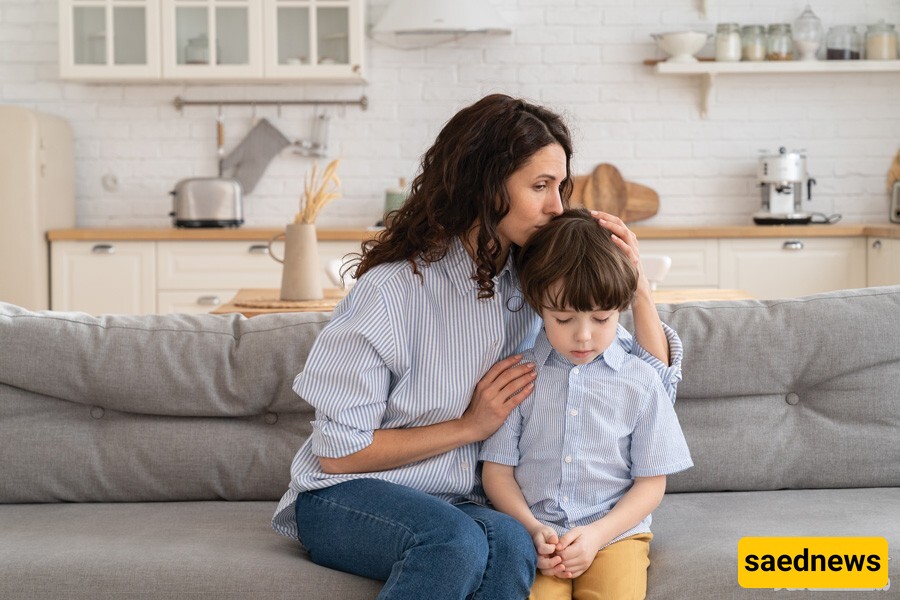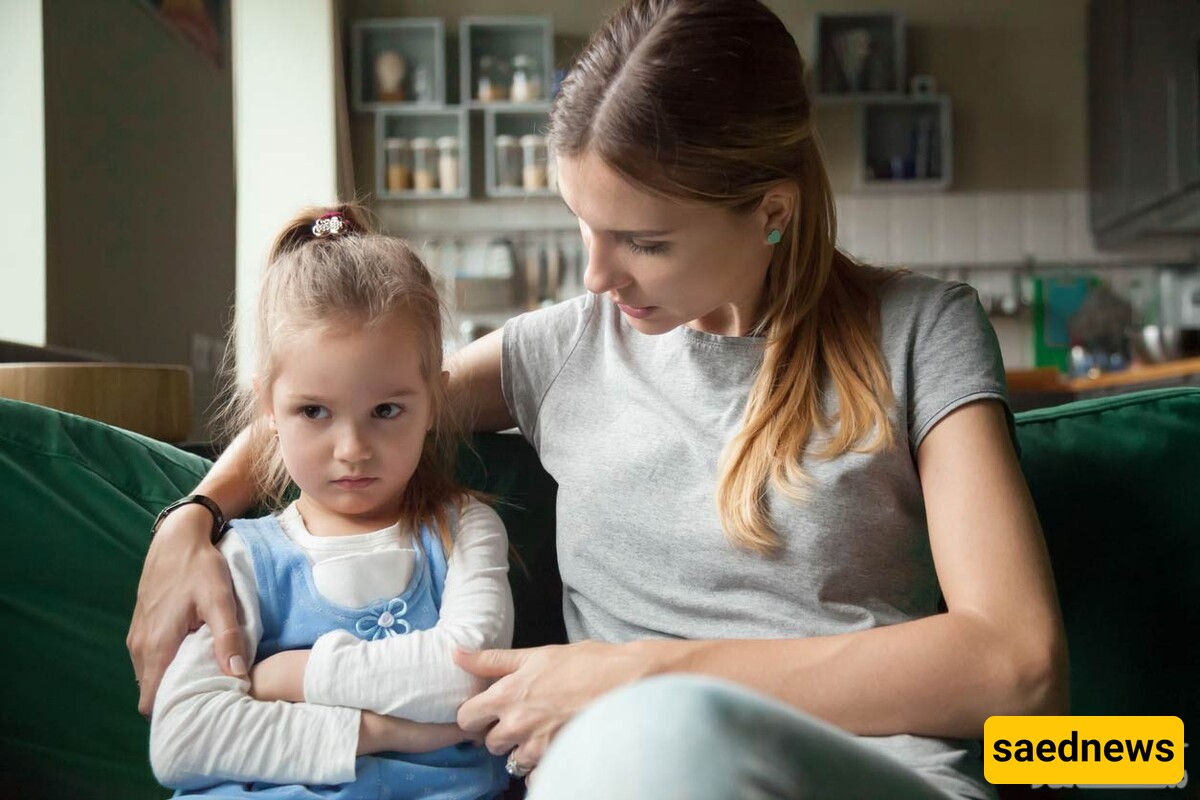Sometimes, parents may make mistakes in dealing with their children and later realize they should apologize. Stay with us as we explore the right time to apologize and the impact it has on children.

The sad truth is that most parents feel uncomfortable apologizing to their children. They believe they must always be right simply because they are older. They also worry that their children might use their apology against them. However, what does a child learn when parents refuse to apologize?
Apologizing means acknowledging that you have done something wrong or behaved inappropriately. It brings a sense of shame and regret for one's actions and words. Wouldn’t it be better to teach your child these lessons by modeling an apology? Everyone makes mistakes at times, but we can strive to make things right. We all hurt others occasionally, and it is important to acknowledge and correct our mistakes.
When you apologize, your child will feel closer to you. There is no need for shame or embarrassment—rather, apologizing leads to a sense of relief and personal growth.

Children closely observe your behavior and learn from it. Teach them the courage to apologize before they learn it from someone else. Below are key reasons why apologizing to your child is important:
All parents want to instill good morals in their children and build strong, healthy relationships. For children to learn to accept their mistakes, take responsibility, and apologize for their wrongdoings, parents must demonstrate this behavior first. By apologizing after making a mistake, you show your child how to properly acknowledge their own errors and take responsibility for them.
Modern culture often does not emphasize humility. Many people strive to win at all costs and rarely show humility. However, when you apologize to your child, you demonstrate humility and show that doing the right thing matters more than asserting authority. This helps your child develop humility and prevents them from becoming overly prideful.
In a healthy marriage, both partners sometimes apologize to each other. The same principle should apply to parent-child relationships. When parents apologize, children learn what a healthy relationship looks like and understand the value of forgiveness, regardless of who the other person is. Through this, they gain an understanding of how to navigate relationships in the future.
Apologizing to children requires careful attention to their emotions and personalities. It should be done in a way that preserves parental authority while setting a positive example. Below are essential tips for effectively apologizing to your child:
Sometimes, parents apologize but still place the blame on the child. For example, saying, "I'm sorry I yelled at you, but you always make your clothes dirty" shifts blame back to the child. Instead, say, "I'm sorry I got angry and yelled at you for making a mess. I shouldn't have done that." This acknowledges your mistake while also making the child aware of their actions.
While it is good to explain your behavior, making excuses weakens the sincerity of the apology. For example:
"I had a tough day at work, and I was exhausted. When you started screaming, I got angry and yelled at you. I know I was wrong, but when you grow up and have children, you'll understand why I reacted that way."
This teaches your child that such behavior is acceptable in adulthood. Instead, say:
"I had a tough day at work, and I was exhausted. But that’s not a good excuse. No one deserves to be yelled at. When we are upset, we must express our emotions without attacking others. I'm sorry."
The best time to apologize is after your anger has subsided. Accepting that you made a mistake helps children understand that nobody is perfect. Instead of aiming to be flawless parents, it is better to find constructive ways to express frustration.
Avoid sharing unnecessary personal details about financial or family problems with your child. Simply say, "I know I was wrong. It wasn’t your fault, and I should have expressed myself differently."

A key part of any apology is assuring the other person that the mistake won’t happen again.
For example, tell your child, "Next time I feel angry, I’ll take a deep breath instead of yelling."Then, make sure to follow through. Children remember everything, and if you repeat the mistake, they will notice your inconsistency.
Some parents believe that simply because they apologized, the child must immediately forgive and move on. However, children—like adults—need time to process their emotions.
Instead of demanding reconciliation, ask, "Are we ready for a hug now?" This approach helps children learn to manage emotional conflicts and reconnect at their own pace. Avoid pressuring them to forgive before they are ready.
When parents express anger or disappointment, children may feel scared and unloved. An apology reassures them that their feelings are acknowledged and that the parent-child bond remains strong. Recognizing your child's emotions helps them regulate their feelings effectively.
If you yelled at them for a messy room, your apology should focus on your reaction rather than criticizing their behavior. "I was wrong to yell at you. I should have handled it better."Accepting responsibility is the first step in a sincere apology.
If you promised your child something and forgot, don’t argue when they express disappointment. Instead, acknowledge your mistake. For example:
"I told you I’d buy you a notebook from the store, but I completely forgot. I’m really sorry. I know you were counting on me, and I shouldn’t have gotten upset with you for reminding me. I’ll make it up to you."
Children rely on their parents’ words. If they repeatedly experience broken promises, they may stop trusting you. By admitting your mistake instead of arguing, you teach them to keep their own promises and to apologize when necessary.
Ensure that your apology helps your child understand the impact of your actions. Young children lack the ability to analyze situations independently. Your explanation helps them distinguish between right and wrong.
For example, you might say:
"We were both very upset, right? You were screaming, then I started yelling, and you ended up crying. I’m sorry if I scared you. I got really upset, but my job as a parent is to manage my emotions properly. Yelling at people we love isn’t right, and I truly regret it."
Let your child see that you are committed to making up for your mistake. A simple apology might not be enough. Show through your actions that you are willing to improve. If you can’t fix the mistake immediately, reassure them: "I’ll make it up to you soon."
If done correctly and at the right time, apologizing has lasting positive effects. Here’s what children learn from parental apologies:
Wrong actions should be acknowledged, and one should feel remorse.
Relationships can sometimes be strained, but they can also be repaired.
Apologizing shows a genuine intention to avoid repeating a mistake.
Everyone makes mistakes, but sincere apologies can improve situations.
If we hurt others, we must take responsibility and make amends.
Apologizing helps the other person feel better.
Saying sorry is not a sign of weakness—it is an effort to strengthen relationships.
There is no fixed rule for when to apologize. It depends on the situation, but it’s best to wait until emotions have settled before speaking with your child. However, don’t wait too long—address the issue as soon as possible in a calm and understanding manner.
Lastly, setting clear boundaries is essential in parenting. Children should learn the importance of respect, cleanliness, and discipline at home. If they fail to follow house rules, remind them firmly rather than apologizing unnecessarily. Demonstrate that respecting rules is the responsibility of everyone in the household.

